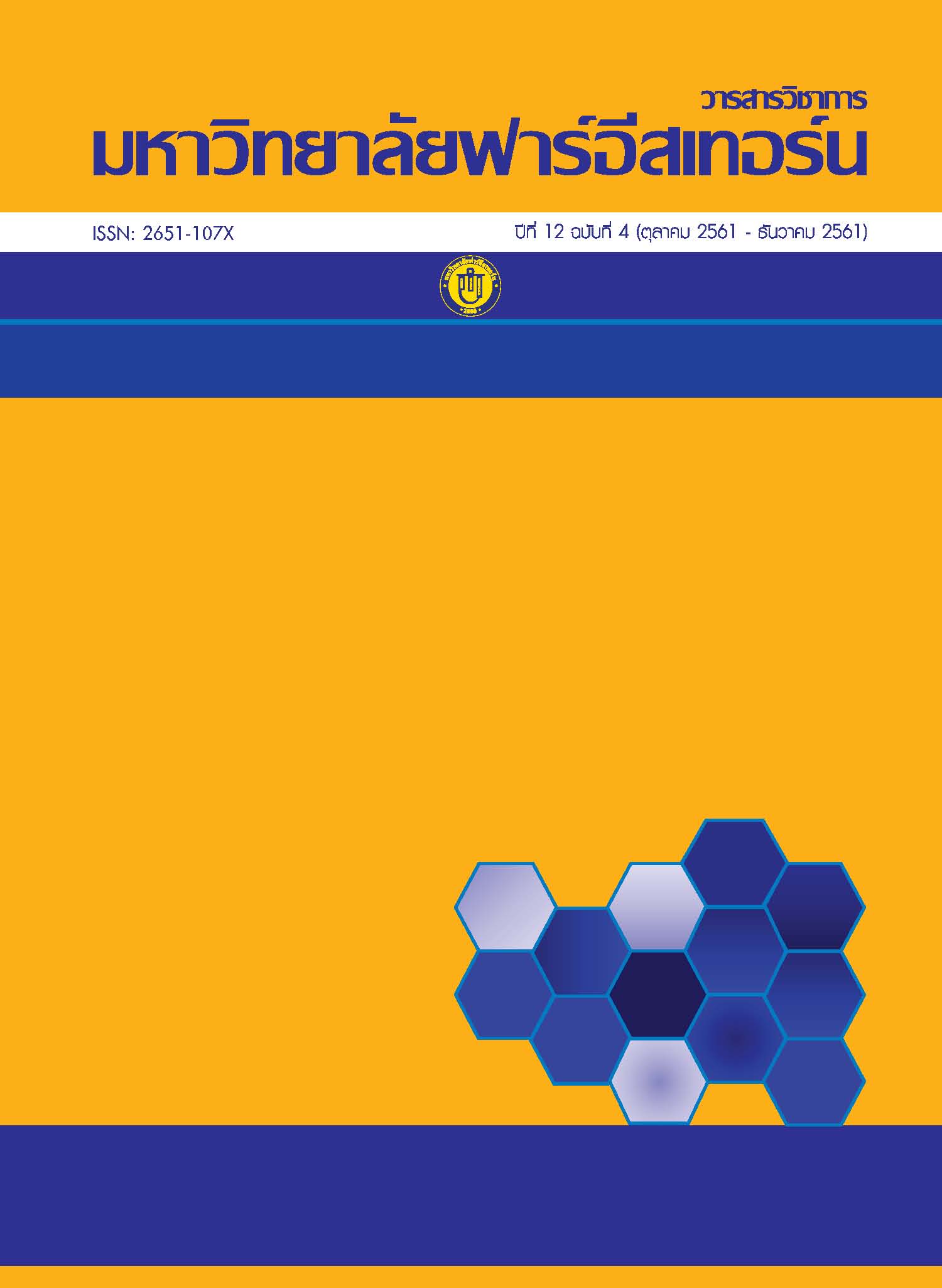Brain–Based Learning Provision in Science Subject for Mathayom Suksa 1 Students
Main Article Content
Abstract
Abstract
The objectives of this study were to 1) compare the learning achievement in Science subject before and after Brain–Based Learning Provision 2) study the learning retention of
30 Mathayom Suksa 1 students after Brain–Based Learning Provision in the second semester of academic year 2015 in Phraowittayakom School, Phrao District, Chiang Mai Province. The instruments of this study were 1) 7 Science subject learning plans of using Brain-Based Learning Provision in acid-base solution for 15 periods, evaluated by the experts.
2) the learning achievement evaluation form in acid-base solution and retention in learning (KR-20=0.87). The comparison of learning achievement in Science subject before and after Brain–Based Learning Provision and paired t-test were 11.903 and p<.01, meaning the students who learned from Brain–Based Learning Provision in acid-base solution gained higher scores with the statistical significance at .01 level. The analyzing of learning retention after Brain–Based Learning Provision was done through two same post tests that were administered 2 weeks apart. The paired t-test were found at -2.024 and p>.01, meaning the students who learned from Brain–Based Learning Provision in acid-base solution had retention in learning. The two post – test scores were not different at the .01 statistical significance level.
Article Details
1. Any views and comments in the Journal of Social Innovation and Lifelong Learning are the authors’ views. The editorial staff have not to agree with those views and it is not considered as the editorial’s responsibility.
2. The responsibility of content and draft check of each article belongs to each author. In case, there is any lawsuit about copyright infringement. It is considered as the authors’ sole responsibility.
3. The article copyright belonging to the authors and The Far Eastern University are copyrighted legally. Republication must be received direct permission from the authors and The Far Eastern University in written form.
References
กรมวิชาการ กระทรวงศึกษาธิการ. (2544). วารสารวิชาการปีที่ 5 ฉบับที่ 1. กรุงเทพฯ: ชวนพิมพ์.
กฤษณพงศ์ กีรติกร. (2547). ก่อร่าง...วางฐาน“สถาบันวิทยาการการเรียนรู้”. สืบค้นเมื่อ 10 สิงหาคม 2550, จาก https://www.nbl.or.th.
กุญชรี ค้าขาย. (2540). จิตวิทยาการเรียนการสอน.กรุงเทพฯ : ภาควิชาจิตวิทยาและการแนะแนว สถาบันราชภัฎสวนสุนันทา.
งานนโยบายและพัฒนาคุณภาพการศึกษา.(2557). ผลการประเมินคุณภาพการศึกษาระดับชาติ. (ในรายงานผลการพัฒนาคุณภาพการจัดการศึกษา ประจำปีการศึกษา 2557 โรงเรียนพร้าววิทยาคม). เชียงใหม่: โรงเรียนพร้าววิทยาคม
พนม เกตุมาน. (2557). คู่มือครูปัญหาพฤติกรรมที่พบบ่อยในนักเรียนและแนวทางการแก้ไข. สืบค้นเมื่อ 28 เมษายน 2557, จาก https://www.psyclin.co.th/new_page_53.htm.
พรรณพิมล หล่อตระกูล. (2557). พัฒนาการทางสมองของเด็ก. สืบค้นเมื่อ 20 กุมภาพันธ์ 2557, จาก https://www.ramamental.com/pan/brain_dev.htm.
มาลินี คุปตรัตน์. (2555). กระบวนการเรียนรู้ ดารา ทีบีเอ็ม. (ในเอกสารการอบรมเชิงปฏิบัติการ Teaching with the Brain in Mind TBM for Beginner). เชียงใหม่: โรงเรียนดาราวิทยาลัย.
วิโรจน์ ลักขณาอดิศร. (2550). การเรียนรู้โดยใช้สมองเป็นฐาน (Brain based Learning: BBL) กับการสร้าง "เด็กเก่ง" สืบค้นเมื่อ 20 ตุลาคม 2557, จาก https://www.l3nr.org/posts/374091.
สถาบันบัณฑิตพัฒนบริหารศาสตร์. (2555). การศึกษา กับ ปัญหาของเยาวชนไทย. กรุงเทพฯ : ศูนย์สำรวจความคิดเห็น “นิด้าโพล” สถาบันบัณฑิตพัฒนบริหารศาสตร์
สถาบันภาษาไทย. (2553).การศึกษาผลการติดตามการดำเนินงานการจัดการเรียนรู้ภาษาไทยที่สอดคล้องกับพัฒนาการทางสมอง (BBL : Brain-based Learning) ระดับประถมศึกษา ในโรงเรียนศูนย์เด็กปฐมวัยต้นแบบเข้มแข็ง.กรุงเทพฯ: โรงพิมพ์ชุมนุมสหกรณ์การเกษตรแห่งประเทศไทย จำกัด.
สำนักงานเลขาธิการสภาการศึกษา. (2560). แผนการศึกษาแห่งชาติ พ.ศ. 2560 – 2579. กรุงเทพฯ :
บริษัท พริกหวานกราฟฟิค จำกัด.
แสงเดือน คงนาวัง. (2557). Brain-based learning. สืบค้นเมื่อ 24 สิงหาคม 2557, จากhttps://www.l3nr.org/posts/95300.
อรพินท์ ตันเมืองใจ. (2556). ความสามารถในการสื่อสารทางวิทยาศาสตร์ของนักเรียนชั้นประถมศึกษาปีที่ 5 ที่เรียนโดยใช้กิจกรรมการเรียนรู้โดยใช้สมองเป็นฐาน. วิทยานิพนธ์ปริญญามหาบัณฑิต,มหาวิทยาลัยเชียงใหม่.
Call, Nicola and Featherstone, Sally. (2003) Thinking child – Brain – based learning for the foundation stage. Network Educational Press Ltd.
Jensen Eric. (2000). Brain-based learning : the new science of teaching & training. San Diego, CA: The Brain Store.
Muhammet Ozden &Mehmet Gultekin. (2008). The Effects of Brain-Based Learning on Academic Achievement and Retention of Knowledge in Science Course. Electronic Journal of Science Education Vol. 12, No.1 (2008).

